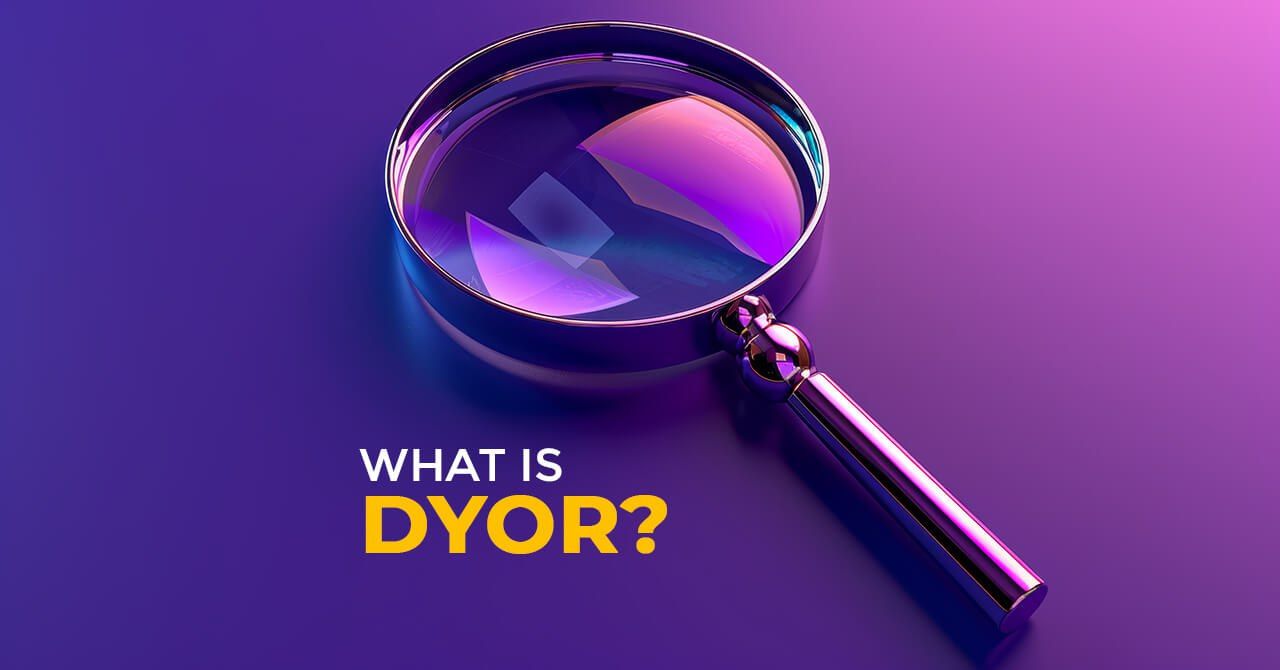
What is the Meaning of DYOR [Do Your Own Research]?
DYOR abbreviation stands for “Do Your Own Research.” It’s a friendly (and sometimes firm) reminder not to blindly follow what others say—especially when it comes to money, investments, or big decisions.
If you’ve ever scrolled through crypto Twitter or watched a YouTube video about investing, you’ve probably come across the abbreviation “DYOR.” It usually pops up right after someone shares an opinion like, “This coin is going to the moon! 🚀 (but DYOR).” However, the phrase doesn’t refer to crypto ideas only. It can be applied to any occasion.
But what is DYOR, and why is it important? Let’s break it down together!
🕵️♂️ What does DYOR mean?
DYOR abbreviation stands for “Do Your Own Research.” It’s a friendly (and sometimes firm) reminder not to blindly follow what others say—especially when it comes to money, investments, or big decisions.
Imagine a friend tells you that eating 10 bananas a day will make you super smart. Before you rush to the grocery store, you’d probably want to check if that’s true, right? That’s basically the idea behind DYOR—always double-check things yourself.
💸 What is DYOR in crypto and finance?
“Do your own research” in crypto is super popular and essential. Why? Because markets move fast, people make bold claims, and scams do exist. Doing your own research helps you:
- Understand what you’re investing in
- Avoid falling for hype or shady projects
- Make smarter decisions with your money
Even experts get things wrong, so it’s always better to check the facts yourself.
“Do your own research” phrase beyond crypto
DYOR isn’t just for investing. It’s actually useful in lots of areas in life. Let’s look at a few:
🧠 School & learning
Before writing a paper or doing a class project, you do research—books, websites, maybe even interviews. To write an essay, you will need to explore the topic you’re writing about to find different opinions on it. That’s DYOR in action!
🧳 Travel
Normally, before going on a trip, you look at hotel reviews, check the weather, and maybe stalk some Instagram tags to see how the beach really looks. Or you can even create a map with places you want to visit in a new country by watching some travel bloggers and reading articles. You do your research.
🛍 Online shopping
When you want to buy a new laptop, TV, or even a car, you will learn everything about the model from articles to different review videos and consulting with a specialist in the store. That’s reasonable as you will not spend five bucks on that and you want to be sure about your purchase.
💬 Everyday conversations
Ever heard a wild fact and thought, “Is that really true?” Googling it is a classic DYOR moment.
Why people say “DYOR” online
People often add “DYOR” when they give advice or opinions because:
- They want to remind you to double-check
- They don’t want to be blamed if things go wrong
- It shows responsibility—sharing info but encouraging personal decision-making
It’s kind of like saying, “This is what I think, but you should still look into it yourself.”
Why is it important to do your own research?
In today’s world, information flies at us from every direction—tweets, TikToks, influencers, headlines. Learning to do your own research helps you:
- Avoid scams
- Spot fake news
- Make your own decisions
- Become more confident and independent
So whether you’re investing in crypto, buying a new phone, or just figuring out if cats really like cucumbers—DYOR is a smart habit.
📝 Final thoughts
DYOR isn’t just a three-letter abbreviation—it’s a life skill. In a world full of information (and misinformation), doing your own research helps you stay smart, safe, and in control.
So, next time you see a wild claim online or hear a too-good-to-be-true tip, just remember: DYOR! You’ve got the power to think for yourself.
I am a native Chinese speaker. I also know two foreign languages (English and Japanese are among them). I am here to share my experience.

